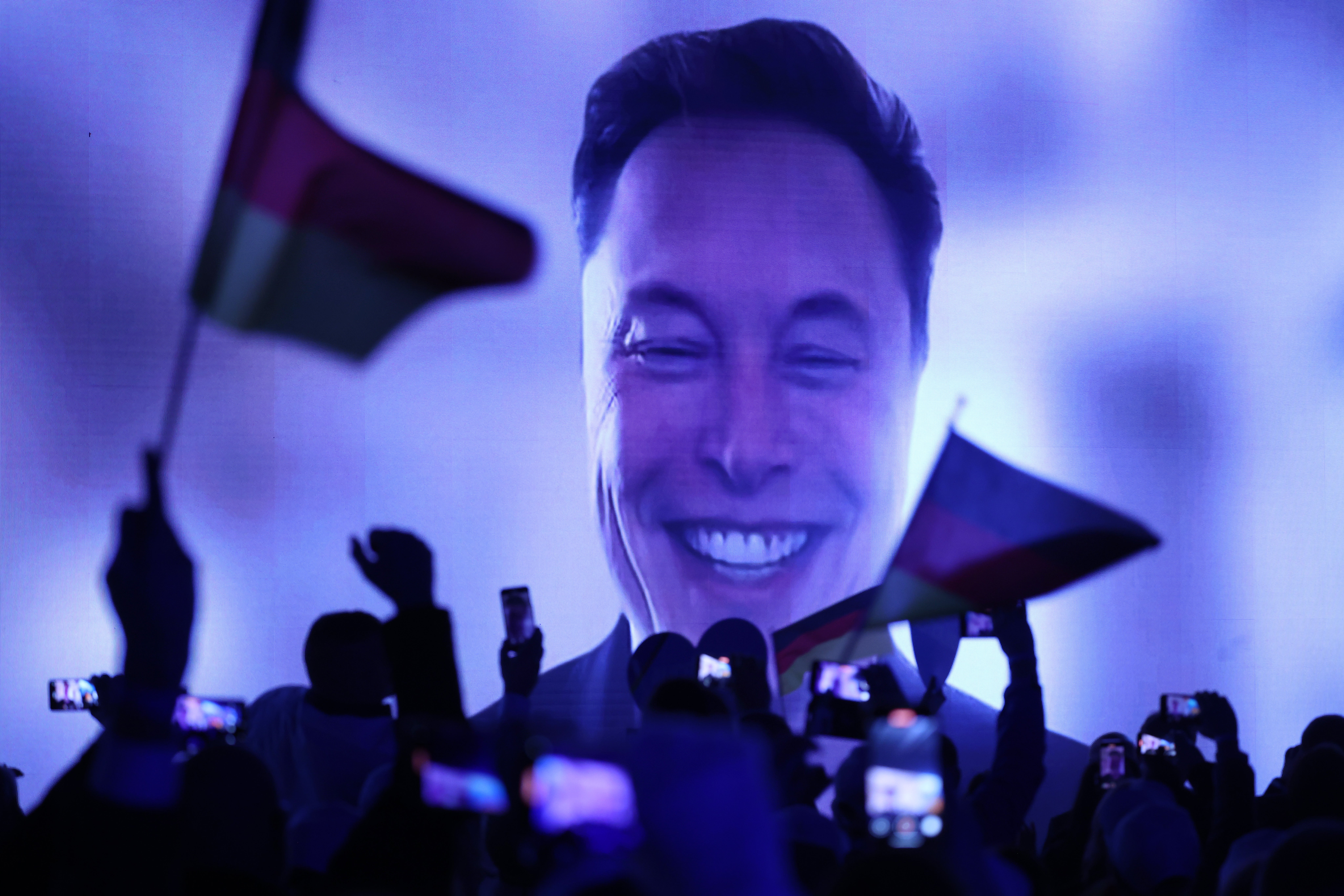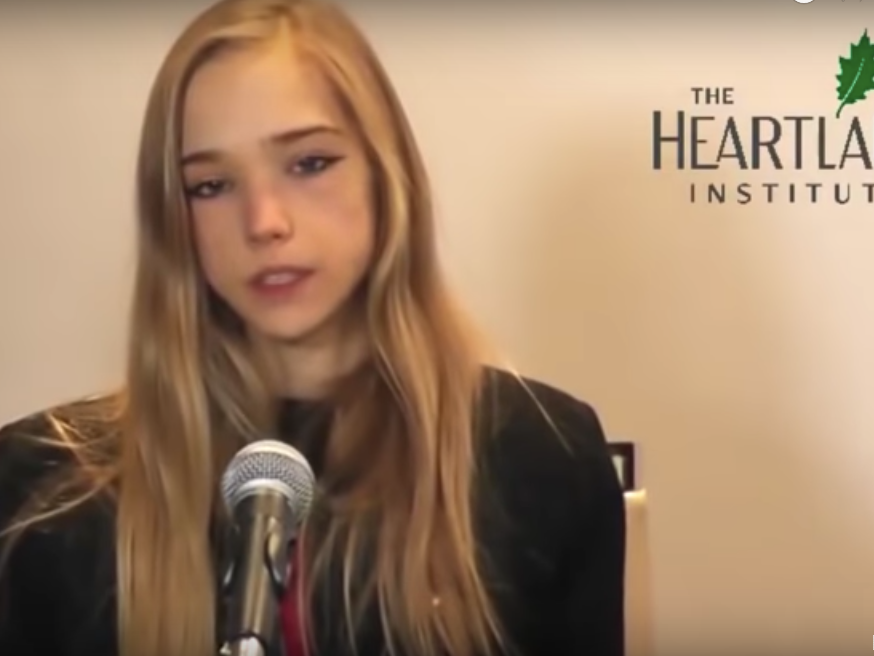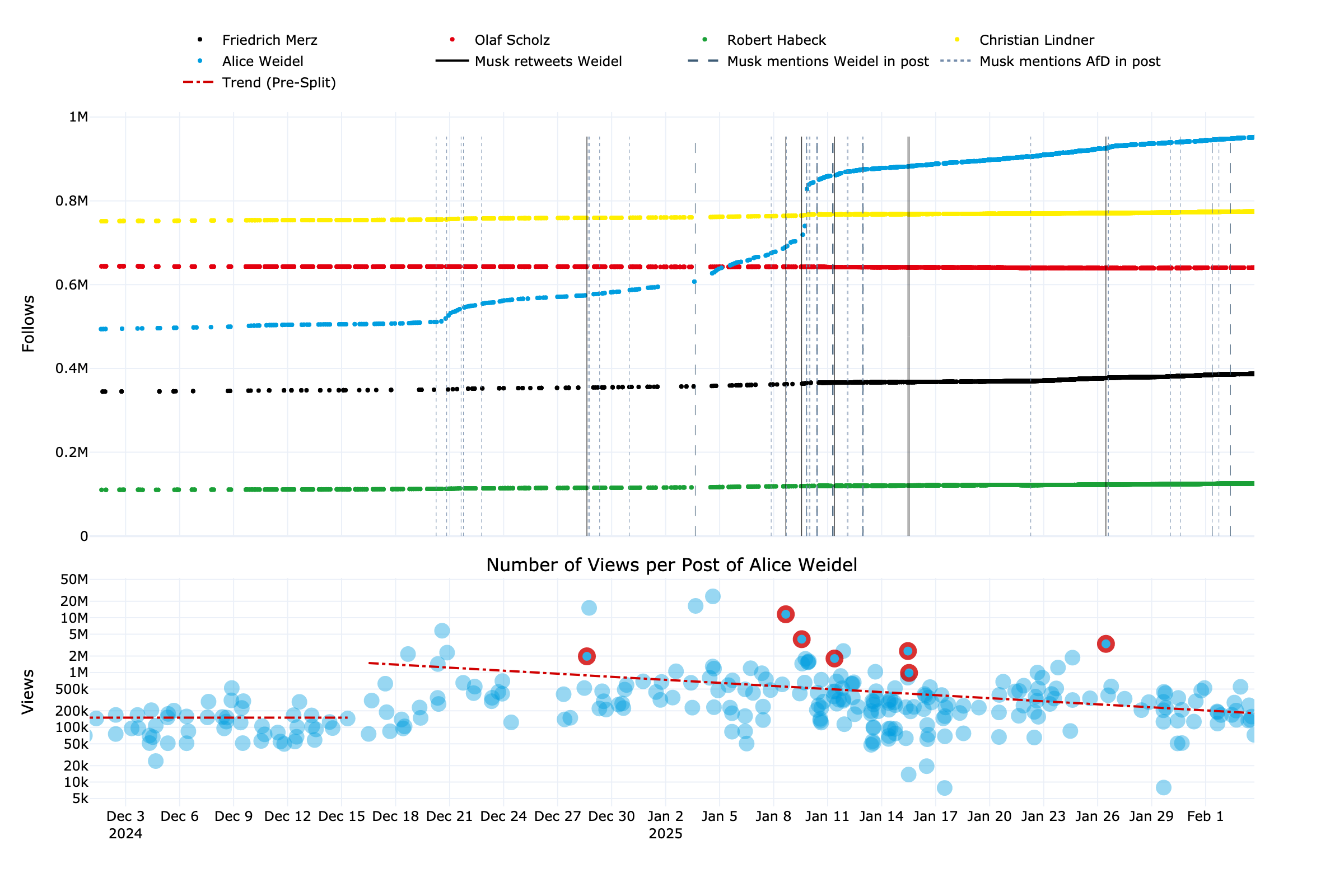When a young German anti-climate activist nicknamed the “anti-Greta Thunberg” began flattering tech billionaire Elon Musk on X, few could have foreseen it leading to the tech billionaire wholeheartedly endorsing Germany’s far-right. It would take just ten months.
Germany goes to the polls on Sunday and there are fears the Alternative for Deutschland (AfD), a political party partly designated as far-right extremists, could win nearly a quarter of the national vote.
X owner turned Trump ally Musk has described the AfD as the only party that “can save Germany”, interviewed the party’s leader, Alice Wiedel, spoken at the AfD’s election rally and written an op-ed endorsing the party.

Much of his interactions have come via English-speaking channels, many with little to do with Germany, and he has been “laser-focused” on migration, despite migration figures having decreased in the country last year. His posts have often shown little concern for reality.
Chancellor Olaf Scholz has described Musk as a “troll”. The expected future chancellor, Freirich Merz, has vowed if he wins office to retaliate against the tech multibillionaire.
Dirk Wiese, a politician in the centre-left SPD wing of the government, told The Independent that Musk has “used his influence for deliberate provocations, misinformation, and the spread of populist narratives”.
Other officials, including defence minister Boris Pistorius, have accused Musk and US vice president JD Vance, who recently urged Berlin to end its policy of not working with the far-right, of “calling into question German democracy”. It is a policy, known as “brandmauer”, which was put in place in the wake of World War II and the death of the democratically-elected Adolf Hitler, to prevent the second coming of fascism.

The seriousness of the concern in Germany about the rise of the far-right group notwithstanding, Musk has freely admitted that before his first interaction with the “anti-Greta Thunberg” Naomi Seibt on April 20 last year, he “didn’t know [the] AfD from a hole in the ground”.
Since she was 19, Seibt has spent five years becoming a right-wing firebrand, slowly building up an audience largely outside of Germany.
She began with opposition to climate activism, working with a pro-Trump, climate denial US think tank called Heartland Institute, but quickly turned to fighting against the “woke mind virus”. She is anti-feminist, anti-Islam, pro-Russian and dismissive of German guilt over its Nazi past.
She was also fiercely opposed to the ban of X in Brazil, believing it to be a war on free speech and against the former Brazilian president Jair Bolsanaro, the country’s version of Donald Trump who has since been indicted for a plot to reclaim power after losing - but refusing to admit defeat in - the 2023 election.
X is the only platform that will not bow down to corrupt tyrants! pic.twitter.com/bdxkRbl5D7
— Naomi Seibt (@SeibtNaomi) April 20, 2024
On 20 April, she tweeted a meme describing Musk as “refusing to negotiate with tyrants”, a nod to his battle in Brazil and his refusal to censor X in Germany. Musk responded within seven minutes. “Doing our best,” he wrote.
Musk had spoken about Germany once before, in September 2023. After describing a video of a German NGO transporting small-boat migrants to Italy as having “invasion vibes”, he dismissed suggestions this was his endorsement of the anti-migrant AfD, saying he knew nothing of the group.
But after that first interaction with Seibt, the German influencer claims Musk started researching the AfD.
The pair would soon strike up a friendship after Musk, in June, asked her publicly: “Why is there such a negative reaction from some about AfD? They keep saying ‘far right’, but the policies of AfD that I’ve read about don’t sound extremist. Maybe I’m missing something.” Ms Seibt had just endorsed the AfD on X.
From mid-July to now, Musk has since directly interacted with Ms Seibt at least 47 times and retweeted her content on many other occasions.
Seibt has tweeted about the AfD some 364 times since January 2024, analysis by the Independent has found; increasing rapidly in the past few months.
Thanks largely to amplification from Musk, these tweets have been viewed over 146.5 million times, our analysis shows.
In the past month alone, Seibt’s mentioned the AfD in at least 132 posts. This amounts to an average of four posts a day, not including her wider political content spanning from anti-migration to warnings of the “woke mind virus”.
Seibt’s following has grown by 442 per cent since her first public exchange with Musk, from around 74,000 in early April 2024 to 401,697 on 19 February.
In May, weeks after her first interaction with Musk, she noted on the Russia social media site Telegram how much easier it was “to get so much attention” writing in English on X.
A few days earlier, Musk had shared a video of a protest in Hamburg by a pro-Iran group called “Muslim Interactive”. More than 1,000 demonstrators were seen holding up posters with slogans like “caliphate is the solution” and calling for the introduction of Sharia law.
The video was posted by Visgegrad 24, a right-wing, pro-Israeli news channel, with an English caption describing the events. The video received 50 million views.
In Musk’s retweet, he wrote: “Surely demanding overthrow of the government in Germany is illegal?” It received 48 million views.
Surely demanding overthrow of the government in Germany is illegal? https://t.co/WHsHHNJBg5
— Elon Musk (@elonmusk) April 28, 2024
Wiedel, the AfD leader, had retweeted Musk’s message. She wrote: “Dear Elon Musk, this event is just one out of many disturbing developments in Germany. Please feel invited to my office in the German Bundestag at your earliest convenience to discuss further details.”
Seibt responded that she would be “happy to participate in a political symposium about this in the Bundestag”, but it was the traction the post received on X that piqued her attention.
“Why do you think the caliphate issue … got so much attention?” Ms Seibt mused in her post on Telegram on 9 May. “Because they were shared by huge American accounts and commented on by Elon Musk.
“It doesn’t matter what you think of Elon or X or the English language: It’s time to pack up the German ego, otherwise we’ll end up very stupidly isolated and overrun by migrants and globalism,” she wrote.

Musk’s own posts mentioning Germany and the AfD began to increase in earnest from late September when he railed against attempts by German politicians to ban the AfD. “This will only strengthen them,” he said.
On 20 December, Musk posted again, responding to Seibt, and said: “Only the AfD can save Germany.”
The post retweeted a video by Seibt, in which she pilloried the German election frontrunner Merz for criticising Musk.
The post was on the same day as a car-ramming attack that killed six at a Christmas market, carried out by a Saudi-born man with strong anti-Islam views who expressed support for the AfD and Mr Musk in online messages but whose motives remain unclear.
It didn’t fit the narrative of Islamic terrorism peddled by the AfD. A day later, Musk shared a post that said “people are drawing the wrong conclusions from the Christmas market killer”.
“He was obviously a lunatic who should never have been allowed to enter Germany,” wrote Musk, before accusing the German government of having “suicidal empathy” for not agreeing to a previous extradition request from Saudi Arabia for the soon-to-be killer.
It was his endorsement of the AfD that solidified his interest in the party. Musk has directly posted about the AfD and German politics dozens more times since then, with near-daily retweets of German political content on X in the last two months.
Much of this centres around allegations of migrant-linked violence; particularly in light of several attacks in Germany over the past six months, the latest being the Munich car attack, suspected to be orchestrated by an Afghan asylum-seeker, which killed two people.
Nicolai von Ondarza, a political analyst, says Musk’s interactions seem “somewhat similar to his intervention in UK politics, where he seems to get his information from a few online influencers who have a very particular view on politics”.
In Britain, Musk reignited the debate around a British child sex scandal, called a female minister an apologist for “rape genocide" against white girls and came to the defence of far-right figure Tommy Robinson, alleging he was being falsely imprisoned. These claims are untrue.
“It’s even worse for Germany,” Von Ondarza says.

Then last month, Musk’s engagement with the AfD became more direct.
On 9 January, he hosted an interview with AfD leader Alice Weidel on X. And on 25 January, Musk was remotely broadcasted into an AfD campaign event, where he said Germany should move on from “past guilt”.
It is impossible to say exactly how Musk’s amplification of the AfD and its leader will shape the vote this weekend.
But his tweets have directly contributed to making Weidel the most popular German politician on X, and broadened the reach of her posts, according to research from the Humboldt Institute for Internet and Society and Synosys.
Sami Nenno and Philipp Lorenz-Spreen, authors of the research, found that retweets or mentions of the AfD and/or Weidel often led to much higher reach than average; from around 200,000 views, to over 1 million.
In addition, the most intensive period of Musk’s interaction with the AfD and related content occurred between late December and mid-January; over which time Weidel’s following nearly doubled, from just over 500,000 to 985,000.
Like Seibt, Wiedel’s following profited enormously from interaction with Mr Musk.
Yet the authors found that the reach of Musk’s amplification has been limited to AfD and Weidel’s presence on X, with no clear correlation between greater influence on Facebook, Instagram, or TikTok.
“So far, we cannot find any strong evidence that Weidel’s popularity on X is also spreading to other platforms. As things stand, the Musk effect is therefore limited to X,” write Nenno and Lorenz Spreen.
Musk’s tangible effect on the AfD’s polling is also up for debate. The group’s rise was in full flow before Musk’s interest in them.
The German economy has been in a recession for two years and is at risk of a third. A spate of terror attacks, including three since the last government collapsed in November, have fuelled anti-immigration sentiments. And the AfD were early adopters of social media, particularly TikTok, capitalising on the attacks.
But Musk’s purchase of X in October 2022 and the subsequent unravelling of hate speech restrictions on the platform brought Germany’s far-right in from the cold of more obscure social media platforms.
For Wiese, Musk “crossed a red line” when he opened up his platform to unregulated, unverified content, the likes that have seen people like Seibt amass a huge following.
“His platform, X, has increasingly become a hub for right-wing conspiracy theories and anti-democratic actors,” he says.
“This has real-world consequences, in Germany, too. Disinformation undermines social cohesion and can influence elections. Musk crosses a red line when he deliberately interferes in democratic processes.
“Those who deliberately sow division, provoke, and disregard historical accountability must face consequences—whether in public perception or in business. Germany will stand firm against any form of foreign interference and disinformation.”
Musk and X have been approached for comment.







